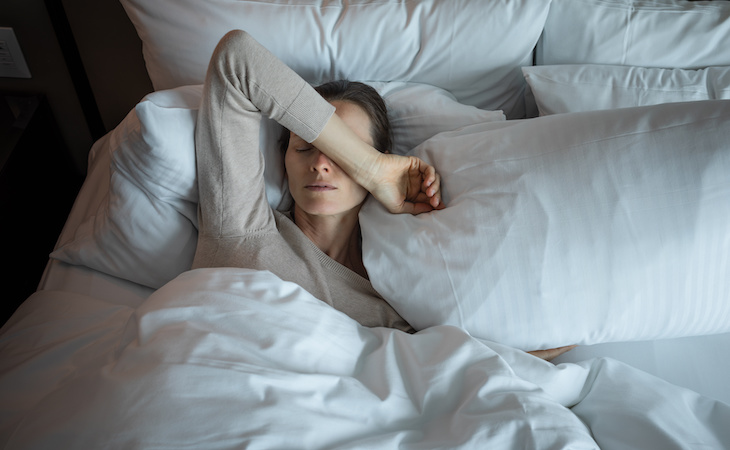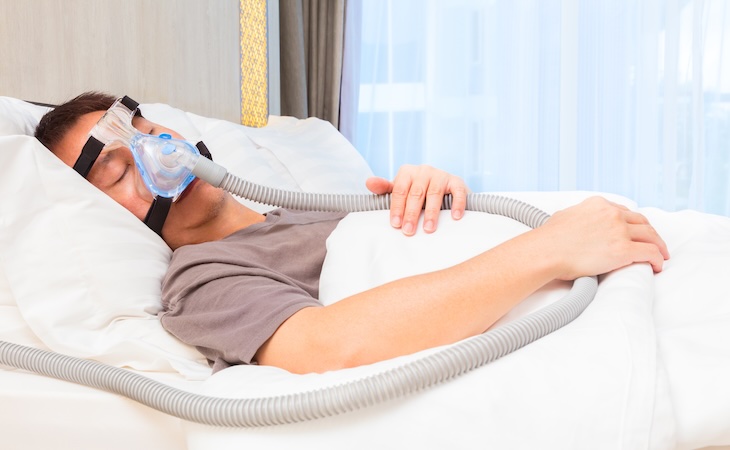When I was diagnosed with celiac disease in March, I was relieved to finally find the culprit behind my stomach issues and fatigue. Sticking to a gluten-free diet (the only treatment for celiac disease) and taking the vitamins recommended by my dietitian have helped me feel better than I have in years.
If you’re one of the three million Americans with celiac disease, then chances are you’ve had symptoms that have interrupted your sleep at one point or another. Here, learn about the connection between celiac disease and sleep and find expert-approved tips for getting better rest with this condition.
What is celiac disease?
Celiac disease, also known as gluten-sensitive enteropathy, is an autoimmune disorder that causes intestinal damage if left untreated. When people with celiac disease eat anything containing gluten—a protein found in wheat, barley, and rye—their bodies make antibodies called transglutaminase (TG) 2 serum autoantibodies that attack their small intestines.
“If you have these antibodies, the cells that line the small bowel are severely damaged,” explains Christine Traxler, MD, family medicine practitioner and contributor to IkonHealth.com. “They lose their ability to absorb nutrients—and when evaluated by a gastroenterologist, the normal architecture of the cells that normally allow for absorption, such as the microvilli of these cells, is destroyed so that absorption of all important nutrients becomes difficult.”
Most symptoms of celiac disease are related to the gastrointestinal tract, says Traxler. “About half of all celiac patients have abdominal pain and bloating.” Diarrhea is another common symptom, due to lack of absorbed nutrients or water, she adds. According to the Celiac Disease Foundation, other common symptoms of celiac disease include anemia, fatigue, arthritis, depression, anxiety, canker sores, and/or itchy rashes. You may also experience weight loss and missed periods, adds Stacy Mobley, licensed naturopathic doctor and certified Ayurvedic wellness counselor.
The nonprofit organization Beyond Celiac notes that it can often take six to 10 years for someone to receive a proper celiac disease diagnosis because symptoms vary so much from person to person and intestinal damage happens relatively slowly. That said, if someone in your immediate family has celiac disease, you’re more likely to have it.
If you suspect you have celiac disease, it’s important to get tested ASAP. Left untreated, celiac disease can lead to cancer, infertility, neurological disorders, and other autoimmune conditions including type 1 diabetes and psoriasis. Celiac disease can be diagnosed via a blood test and upper endoscopy.
How does celiac disease affect sleep?
Many symptoms of celiac disease, whether related to the gut or not, can lead to sleep problems, but it varies from person to person. “There are some studies that do not show evidence that people with celiac disease sleep any more poorly than other people,” says Traxler. “On the other hand, there have been valid studies indicating sleep disorders and sleep problems in those with celiac disease.”
Some of the most common celiac disease symptoms that make it harder to get a good night’s sleep include:
- Restless Legs Syndrome (RLS): This sleep-disrupting syndrome is associated with iron deficiency, a hallmark sign of celiac disease. RLS causes unpleasant or uncomfortable sensations in the legs that often result in a strong urge to move them.
- Acid reflux: Many people with celiac disease, myself included, experience regular heartburn, which can play a role in poor sleep. “It awakens the person at night frequently and can lead to chest pain or a bad taste in the mouth from acid backing up in the throat and mouth from the stomach,” explains Traxler. (Learn about what causes farting in your sleep and how to stop it.)
- Anxiety and depression: Those with celiac disease, particularly women, experience higher rates of anxiety and depression. This may be due to the neurological effects of malnutrition caused by the condition, says Traxler. Both anxiety and depression make it harder to get quality sleep—and poor sleep exacerbates anxiety and depression, leading to a vicious cycle.
- Fatigue: You might think that being tired all the time would make it easier to sleep, but that’s not actually the case. “While the celiac patient is generally more tired and fatigued, which is common in autoimmune diseases, this doesn’t translate to better sleep,” says Traxler. “Sleep is disrupted and nighttime sleep is disordered in general.”
- Joint pain and headaches: Both of these are also more common in people with celiac disease and can contribute to poor sleep. In fact, joint pain and headaches are common symptoms of many autoimmune diseases, notes Traxler.
Surprisingly, following a gluten-free diet isn’t necessarily a magic solution for celiac-related sleep problems—although it’s an absolute must because it’s the only way to prevent intestinal damage. A study published in Alimentary Pharmacology & Therapeutics shows that sleep problems still persist in people with celiac disease even after they’ve gotten things under control.
“This suggests that poor sleep in celiac patients is not related to having untreated disease but may be more likely related to having an autoimmune disease alone,” Traxler says. “Autoimmune diseases by themselves will cause sleep disturbances that are not necessarily related to the type of autoimmune disease the person has.”
What can you do to sleep better with celiac disease?
While dealing with celiac disease can be tricky, there are some easy steps you can take to improve your sleep:
Manage your diet
While going gluten-free won’t solve all of your sleep problems, the right diet is key to your overall health, says Mobley. When you have celiac disease and eat gluten, you leave yourself open to irritation from other foods, such as dairy—and that can lead to a host of sleep-disrupting issues like stomach and joint pain, Mobley says.
Cutting out gluten will allow your gut to heal so you no longer have to deal with those problems. Mobley suggests a plain diet for 14 days to give your gut a clean slate. Stick with simple food—steamed vegetables and baked chicken breasts is a good meal, for example. (Here are the best foods to help you sleep.)
Hydration is key as well. “Water keeps everything moving,” says Mobley. Not only does it aid in digestion, but it also keeps your joints lubricated so you’re less likely to experience pain.
Take the right vitamins and supplements
Once your diet is in good shape, it’s time to start thinking about vitamins and supplements. Because people with celiac disease have a harder time absorbing nutrients, they’re often deficient in key nutrients, including vitamin B, vitamin D, and magnesium, all of which play a role in energy levels and sleep.
Mobley prefers IV therapy to a multivitamin tablet for celiac patients. “It delivers nutrients straight to where the body needs it,” she says. If you don’t have access to a medical professional who offers IV therapy, your next best option is a liquid multivitamin, she says.
Another nutrient to consider: iron. If you’re anemic and have RLS, supplementing with iron should help ease those symptoms, says Traxler. (Always ask your doctor before adding any new vitamin or supplement to your routine.)
Ease acid reflux symptoms
If acid reflux bothers you at night, one thing you can do is raise the head of your bed to reduce symptoms, says Traxler. You can raise the head of your bead by stacking up pillows, using a wedge pillow, or investing in an adjustable base.
Other ways to prevent acid reflux at night: avoid eating and drinking caffeinated or carbonated beverages before bedtime. Proton pump inhibitors or histamine-2 blockers also help curb symptoms, so check with your doc to see if either of those medications is right for you. Mobley, meanwhile, recommends trying to make lunch your largest meal of the day.
Practice good sleep hygiene
“You want to make sure you have a good-quality room to sleep in,” says Mobley. “Make sure your room can actually get dark, and that you have a comfortable mattress.” Avoid looking at a computer, tablet, or phone before bed since those can all make it harder to fall asleep, adds Traxler.
Beyond setting your room up for sleep, do some calming activities to get your mind ready for bed, like meditation or yoga. “One thing I like to have people do is a ‘brain dump’ at the end of the day,” says Mobley. “Get anything that’s on your mind onto paper and get it out.”
For more advice on unwinding before bed, try these relaxing nighttime activities.




